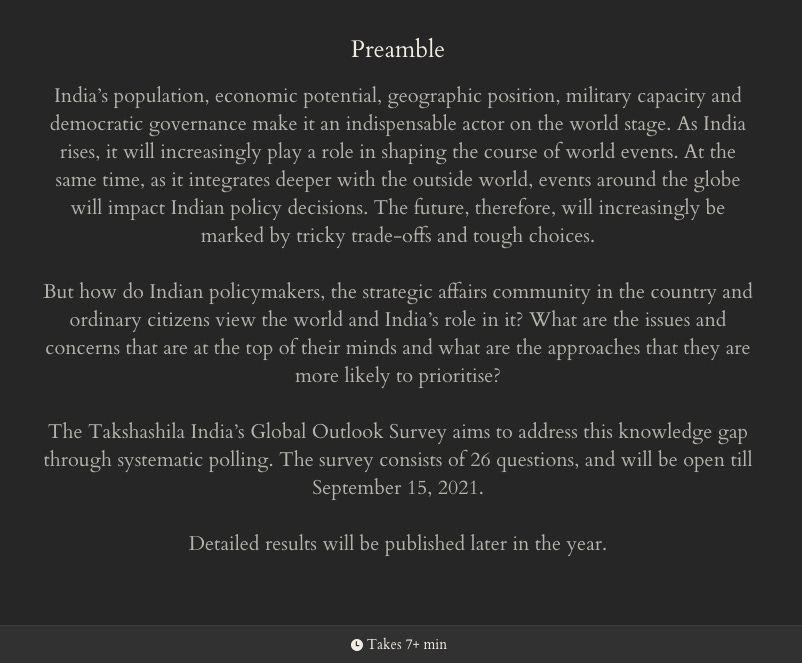Takshashila Sandesh - August 2021
A newsletter connecting Takshashila alumni to ideas, opportunities, and networks
— Sowmya Nandan & Apurva Kumar
We are back with another dispatch of Sandesh where we share work opportunities in policy, events, and other perspectives from the Takshashila Institution.
Work/Internship Opportunities
Government affairs and public policy manager at Google
Internship opportunities at CSEP
Research Lead at Centre for Internet & Society
Multiple openings at Centre for Social & Behavior Change
The Asia Pacific Fellows Program at RAND
Content Policy Analyst at LinkedIn
Featured Alumni Story | Meghna Saha
Meghna Saha is a designer and museologist. She is currently working as a fundraiser for U.S. Department of State’s, National Museum of American Diplomacy. What began as an investigation into how design thinking may apply to ethno-cultural conflicts, transformed into an examination of the harder aspects of soft power. She began tracking the strategic ambitions of countries to discover how geopolitics impacts everyday life from identity politics to brand monopolies.
Meghna believes that every citizen needs to cultivate his or her own balanced perspective of India and its place in the world, especially as the nature of future conflict is moving from distant frontiers to information warfare brought directly to phones.
She thinks Takshashila’s Defence and Foreign Affairs program and expert faculty, provide a fundamental understanding of the policy process and security architecture with which students can creatively destroy and reconstruct untested perceptions of India’s capabilities. The program gives her the confidence to be a more informed citizen and the practical tools with which she can now engage with, rather than simply witness, the many changes that India will face in the coming years.
You can connect with Meghna here linkedin.com/in/meghnasaha
Students’ Insights
Are CSR regulations relevant anymore? : ‘Businesses, typically, do give rise to externalities but this has to be addressed via regulations and strong enforcement. However, corporate philanthropy is a personal choice. Hence, the foundation of the CSR law itself to enforce corporations to donate is weak. It’s akin to interference. Even if the original objective of the CSR law was to address negative externalities created by the businesses, the route taken has been incorrect’- Devang Bhandari (PGP 5)
Genomic sequencing hubs must be made a permanent part of India’s pandemic response: ‘The roll out of vaccines to tackle the spread of the novel coronavirus has brought relief to the entire world. However, inequity in vaccine distribution has created opportunities for new variants to emerge. A robust genomic surveillance program must be developed in India and then scaled up by December 2021, to rapidly detect and evaluate new variants. This will be essential to manage and mitigate threats to collective public health’ - Salil Kallianpur (HLS 3)
If you are also working on an interesting public policy issue and want to share it with others, then do write to us at outreach@takshashila.org.in
Takshashila Gyan
Technopolitik is a new newsletter by the Takshashila Institution. Its focus is on the intersection of technology and international relations from an Indian national interest perspective. In the latest dispatch, Pranay writes, ‘The Afghan situation is a subset of how a conflict will play out in the Information Age. Putnam’s classic two-level game framework describes the general case of conflict quite well. He argued that the politics of many international negotiations can be imagined as a two-level game’.
Podcasts
Takshashila’s founders discuss post-COVID inequalities: The socio-economic impact of the COVID-19 pandemic has increased inequalities. In this episode, Sarthak talks to Takshahila's founders - the two N's, Narayan Ramachandran and Nitin Pai - about the disparities exacerbated by the pandemic and what can be done about it.
India’s reverse migration: According to the latest CMIE estimates, there has been a reverse migration of labour from the manufacturing sector to the agriculture sector due to the pandemic and subsequent lockdowns. The loss of jobs in small and medium manufacturing units have resulted in people going back to their farms and thus engaging in less productive employment. In this episode, Suman Joshi and Apurva Kumar discuss the latest trend of reverse migration of labour in India.
Creating an Epidemic Intelligence Agency: The COVID-19 pandemic highlights the need to develop the ability to assess biological threats. India has mechanisms in place to monitor some health-related trends and biological events, but there exist several lacunae. A Takshashila Institution discussion document proposes the creation of an Indian National Epidemic Intelligence Service. Ruturaj Gowaikar and Shambhavi Naik discuss the role of such an organisation and how it would work.
What has Takshashila been up to?
The first-ever Takshashila India’s Global Outlook Survey is now live. The survey is an effort to bridge the knowledge gap around how Indian policymakers, the strategic affairs community and ordinary citizens view the world and India’s role in it. The survey consists of 26 questions covering domains like India’s bilateral and multilateral engagements, national security concerns, economic diplomacy and attitudes towards the use of force.
The third workshop of the Post-Graduate Programme (PGP) in Public Policy was held between Friday, 27th August to Sunday, 29th August. The aim of this workshop was to give feedback on the Capstone project topics chosen by the students. In addition to this we also have sessions by policy practitioners on the theme ‘Effecting Change’.
The Takshashila Alumni Portal, ‘Kalpa’ is now live. Register yourself and stay in touch with the Takshashila community.
That’s it for now. If you have any comments or suggestions, write to us.






